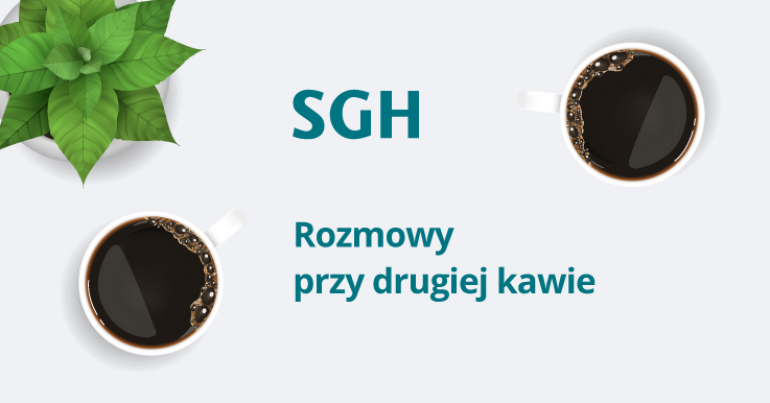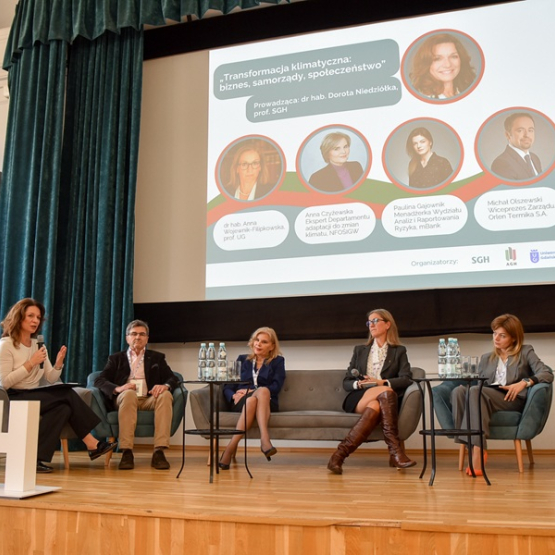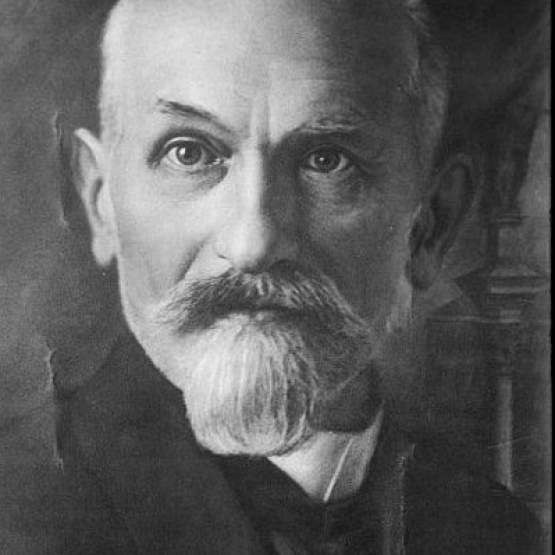Conversations over a second coffee Responsibility of Higher Education – what does it mean? Reflections from the wartime

On 15 December, the third webinar in the current academic year in the cycle of monthly meetings "Conversations over a second coffee" took place. The title of the webinar was "Responsibility of higher education - what does it mean? Reflections from the wartime.” The aim of the presentation was to invite Polish and European universities to discuss how to educate students in the spirit of responsibility for democratic values and the social environment.
The presentation was given by Professor Nataliia Stukało, Vice President of the National Agency for Quality Assurance in Higher Education, NAQA, (Ukrainian Quality Assurance Agency) and member of the INQAAHE Board.
On behalf of the authorities of the Warsaw School of Economics, the guests were welcomed by Dr. Iryna Degtyarova, the Representative of the Rector of the Warsaw School of Economics for Cooperation with Ukrainian Universities. She emphasised the unique role of NAQA in Ukraine, which is de facto one of the greatest achievements of the transformation of higher education in Ukraine and an institution that shapes the culture of quality, reliability and transparency in the academic environment. Moreover, in 2020 NAQA signed a cooperation agreement with the Polish Accreditation Committee and the Committee for Scientific Evaluation (in terms of ensuring the quality of doctoral education), and today the strengthening of Polish-Ukrainian relations in this area is very important, including, for example, development of joint educational programmes, various initiatives and the recognition of qualifications.
At the beginning, Professor Stukało recalled the tasks of higher education:
1. The responsibilities of Higher Education Institutions (HEIs) include, among others, awareness of “the seriousness of world tensions, the potentiality of human annihilation by atomic weapons, the problems arising from the increase in the number of people in the world’s population, the reduction of natural resources, and a pervading sense of uneasiness about the future” (Jones, 1957)
2. For many students, HE serves three particular functions: to gain decent employment, to achieve personal growth, and to contribute to the improvement of the society (Eurostudents project on students’ understanding of the purposes of HE, 2021)
3. In addition to those two main functions, academic and didactic, universities have a third function, here referred to as the "democratic function".
Following the Council of Europe, the Committee of Ministers recommendation (2007): “In keeping with the values of democratic and equitable societies, public authorities should ensure that higher education institutions, while exercising their autonomy, can meet society’s multiple expectations and fulfil their various and equally important objectives, which include:
• preparation for sustainable employment;
• preparation for life as active citizens in democratic societies;
• personal development;
• development and maintenance, through teaching, learning and research, of a broad, advanced knowledge base.
Therefore, universities should specifically ensure that graduates have such social competences that contribute to the strengthening of democratic values.
Professor Stukało cited research on the role of universities in times of crisis and war. Here are some quotes from the research:
• Universities and the whole HE are supposed to make significant efforts and re-adjustments to survive and to be useful for the society (Robert E. Spiller, Higher Education and the War, The Journal of Higher Education, Vol. 13, No. 6 (Jun., 1942), pp. 287-297).
• The role of HE in the post-war societies is “to act as a catalyst for effective and sustainable post-war recovery”. There is a relationship between HE and core intervention agendas in post-war times and these are: stabilisation and securitisation, reconstruction, state-building and peace-building (Sansom Milton & Sultan Barakat (2016) Higher education as the catalyst of recovery in conflict-affected societies, Globalisation, Societies and Education, 14:3, 403-421, DOI: 10.1080/14767724.2015.1127749);
• HE can do more to transform conflict and build peace and believes that universities are critical actors in peace-building, sharing and promoting core humanity values, they also respond to challenges arising from social inequalities, ethnic divisions and a culture of violence (Basma Hajir, Sara Clarke-Habibi & Nomisha Kurian (2022) The 'South' Speaks Back: Exposing the Ethical Stakes of Dismissing Resilience in Conflict-Affected Contexts, Journal of Intervention and Statebuilding, 16:1, 1-17, DOI: 10.1080/17502977.2020.1860608;
• The emergency situations such as pandemic, war as well as “social change around issues of race and equality” raise the importance of HE efforts. The HE core values are formed in the context of societal requests and challenges arising from the political, social and economic instability in the contemporary world (Eaton, 2021).
After the beginning of the Russian invasion of Ukraine, the National Agency for Quality Assurance in Higher Education of Ukraine, NAQA, conducted research that showed it should continue its previous activities so that Ukrainian higher education could fulfil its tasks despite the war. In particular, the quality of higher education is and will be crucial in the long run both to rebuild the Ukrainian economy and to promote civic competences.
Professor Stukało pointed to five main tasks that Ukrainian universities fulfilled during the war:
1. Sustainability of knowledge creation and sharing
2. International dialogue and cooperation
3. Societal engagement: volunteering, shelters, community hubs, unbreakable centers
4. Trust-building among stakeholders
5. Supportive communication & consultative role
An important new task of HE is its third mission, so vividly and brutally exemplified today in academia’s attitude towards armed hostile conflicts. Thus it is important to provide education despite the war – this education is largely conducted remotely, thanks to which students can participate in classes from different locations, for instance from the frontline, war zones, places of temporary stay and residence (in Ukraine or abroad), and classes can be conducted from different locations as well – large part of universities has been destroyed and there is no physical possibility to conduct any activities on their premises. This is where universities use their experience of conducting distance learning gained during the COVID-19 pandemic.
What role will the university play after the war? Increasingly, the role of HE is to address the societal challenges arising from the war, the Covid-19 pandemic, as well as the economic, migration and energy crises. Under the influence of extreme external circumstances the role of HE in promoting and ensuring a sustainable future and achieving the UN SDGs (United Nations’ Sustainable Development Goals) has been significantly growing. The society expects and demands that HE trains active, critically thinking citizens who are able to defend democratic and human values and represent the society's opinion.
Professor Stukało summarised her reflections on higher education, pointing out that this sector is still affected by issues such as human rights, democratic values, respect for the law and the fundamental values of the European Higher Education Area. But also, especially in the area of the third mission, the higher education sector is affected by social challenges, needs, and crises such as: pandemics, wars, crises, e.g. energy, migration or economic crises, as well as environmental security and the creation of conditions for the development of peace.
Quality in higher education is responsible for: the creation of knowledge and its transmission, the preparation of students for the labour market, the formation of civic competences and democratic values among students, the support for the implementation of the Sustainable Development Goals, the promotion of peace and security and the promotion of universal values.
In the second part of the webinar, a discussion took place. Professor Stukało suggested the following 4 questions for discussion:
1. To what extent HE is responsible for war aggression prevention and for spreading core democratic and humanity values in the society?
2. Is HE doing enough to strengthen democracy and peace in Europe and all over the world?
3. How HE could contribute to the post-war rebuilding of the countries?
4. What is the role of HE in sustainable development?
In particular, Professor Zbigniew Marciniak from the University of Warsaw, Professor Jacek Szołtysek from the University of Economics in Katowice, and Dr Iryna Degtyarova and Ms Izabela Godlewska from the Warsaw School of Economics took part in the discussion.
The discussion focused, among other things, on the issue of forming social attitudes in students aimed at supporting democratic values and on the University's third mission, which focuses on implementing the Sustainable Development Goals. In the discussion it was emphasised that values cannot be taught, but academic education can be designed to promote and enable students to strengthen these values, which, among other things, ensure human rights. This places high demands on the academic community, which should also promote values such as fundamental recognition of individual autonomy, tolerance, critical thinking and respect towards others.
During the discussion part, Professor Marek Frankowicz from the Jagiellonian University informed the participants that an international project QUARSU - Qualifications Recognition Support For Ukrainian Universities, is currently being implemented within the framework of Erasmus+ with the participation of the Warsaw School of Economics as a partner, and it deals with Ukrainian universities and the recognition of formal and informal qualifications. It may be worthwhile to follow the results of this project, especially regarding the recognition of learning outcomes acquired by Ukrainian students at foreign universities during the war.
Iryna Degtyarova pointed out several key issues. First of all, the issues raised and discussed by Prof. Nataliia are of fundamental importance for higher education and are crucial not only for the Bologna Process, but also globally, as they relate to the role and mission of the university, especially its third task in the modern world. Today, Ukrainian and Polish universities are becoming centres of humanitarian aid, deepening their social service, engaging in solving specific local community problems and challenges, also related to war. We see it in Ukraine, we observe it in Poland, we experience it at the Warsaw School of Economics. Difficult times require a strong social commitment from the university. Indeed, this third mission is becoming more expressive and unique before our eyes, going beyond its traditional areas - technology and knowledge transfer, cooperation with the environment. In addition, it is worth paying special attention to the quality of education, because if you look at the number of fully or partially destroyed Ukrainian educational institutions, they are secondary schools. This could have serious implications for the higher education of future applicants. Another problem is that the education and science sector is not discussed in the high-level political meetings with the European Union as part of Ukraine's international reconstruction plans. This is why CRASP (Conference of Rectors of Academic Schools in Poland), together with Rectors from French and German universities, has appealed to the G7 conference to include higher education and universities in the plans for the reconstruction and modernisation of Ukraine. We hope that this will happen and that Poland will help as well.
The webinar ended with the conclusion that the current experience of Ukrainian universities is unique and very difficult, but it is worth considering it as a certain lesson for the whole higher education system that functioned during the war. At the same time, these experiences of Ukrainian universities could serve as a basis for reflection for Polish universities, because although there is no war in Poland at the moment, the case of Ukraine shows that peace never lasts forever... We hope that Polish universities will not have to use this experience directly. Unfortunately, there is always such a risk, therefore the role of universities is to prevent it by all available and possible means. We can do it through quality education promotion of democratic and basic human values, and social engagement - through our incessant efforts to both equip students with relevant skills/competencies, and to teach them to work towards the SDGs.



